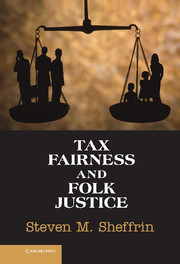Book contents
- Frontmatter
- Dedication
- Contents
- Preface
- Glossary of Terms in Psychology, Philosophy, and Economics
- 1 Approaching Tax Fairness
- 2 The Foundations of Folk Justice
- 3 Fairness and the Property Tax
- 4 Should We Redistribute Income through Taxation?
- 5 Why Do People Pay Taxes?
- 6 Desert, Equity Theory, and Taxation
- 7 Concluding Perspectives
- Bibliography
- Index
4 - Should We Redistribute Income through Taxation?
Published online by Cambridge University Press: 05 July 2013
- Frontmatter
- Dedication
- Contents
- Preface
- Glossary of Terms in Psychology, Philosophy, and Economics
- 1 Approaching Tax Fairness
- 2 The Foundations of Folk Justice
- 3 Fairness and the Property Tax
- 4 Should We Redistribute Income through Taxation?
- 5 Why Do People Pay Taxes?
- 6 Desert, Equity Theory, and Taxation
- 7 Concluding Perspectives
- Bibliography
- Index
Summary
In Chapter 3, we focused on the key role that procedural justice played with respect to both public perception and political experience with the property tax. In this chapter, we explore the role of redistribution through income taxes and estate and gift taxes. In this realm, the folk justice concepts of equity theory, modified fairness, moral mandates, and system justification theory all play key roles.
In Chapter 1 we highlighted that the public has conflicting attitudes toward redistributing income through the tax system. While traditional economic models suggest that considerable redistribution would improve social welfare, at least in the United States, the public does not wish to pursue such a project. As we demonstrate in this chapter, the American public is traditionally split down the middle on whether we should redistribute money from the rich to the poor. There is no deep taste for redistribution. These attitudes have been consistent over time, with only 35 percent supporting redistribution and 54 percent opposing it at the end of the Great Depression.
This chapter explores three ways in which public opinion differs from expert opinion in the realm of redistribution. First, why is there such conflicted support for redistribution, particularly as measures of economic inequality have increased in recent decades? Second, why do Americans insist that recipients of public assistance engage in work, even if the work may be of the “make-work” variety? Finally, why is there so little support for the estate and git tax in the United States, especially since it affects such a small number of individuals?
- Type
- Chapter
- Information
- Tax Fairness and Folk Justice , pp. 118 - 160Publisher: Cambridge University PressPrint publication year: 2013

